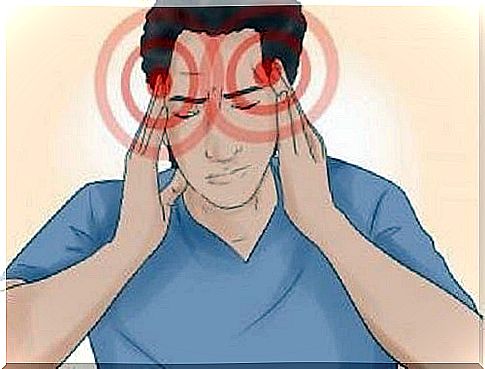What Are The Symptoms Of Headaches Caused By Stress?

Stress is a stiffness or tension caused by various unpleasant or overwhelming situations. These situations can lead to psychological disorders or psychosomatic reactions, including headaches. The symptoms of headaches caused by stress are diverse and can start with low or high intensity. You may feel a slight pressure on the head or a severe migraine.
In addition, the symptoms of headaches caused by stress differ from person to person. A common pain can have various causes, such as migraines, insomnia, fatigue and more.
If you have a headache at least twice a week for several months, you may suffer from chronic headaches. The causes of this symptom can be physical, such as allergies that cause sinusitis or mental, such as worry. Stress is one of the most common mental causes of headaches.
What are the causes of headaches caused by stress?

- Constant stress
- The fact that you keep your head in the same position for a long time
- The habit of working a lot on the computer
- Sleeping with your head in an unnatural position
- Overexertion of the eye muscles
- Smoking, alcohol or excessive caffeine consumption
- Sinusitis or nasal congestion
- Cold or flu
- Tightening of the neck and scalp muscles
Headache caused by stress is not associated with damage to the brain structure or other serious illnesses. Daily worries are one of the common causes of stress.
But there is a difference between thinking about something and being worried about it. When you think about it, look for solutions to that problem. When you worry, you are “paralyzed” and stuck in the same reasoning. Thus, your mind gets tired and headaches appear.
Psychologically, the headache caused by stress is very interesting. Stress changes the chemical structure of the brain and the balance in the muscles, vertebrae and nerves in the skull. Therefore, a tension occurs that causes the headache.
If the stress is mild or temporary, it does not cause pain. But when it is prolonged for a long time, the body remains in a state of alert that weakens the body’s immunity. Thus, you feel tired and face the symptoms of headaches caused by stress.
Symptoms of headache caused by stress

- Low, continuous and annoying headache. It can be isolated or recurrent.
- More intense pain around the temples, scalp and neck
- Fatigue
- Sleeping disorders
- Muscle aches (shoulders and upper back)
- Sensitivity to weather changes, noise and light
If the pain is mild, you can treat it with natural remedies. But if it is strong and persistent, it is advisable to consult a doctor.
Tips to reduce the frequency of headaches caused by stress

If, in addition to the symptoms of headaches caused by stress, you also experience other discomforts, such as muscle tension or gnashing of teeth, you may end up suffering from an intense pain that will diminish your quality of life. Therefore, it is necessary to take measures to control stressful situations. E.g:
- Enjoy activities: listen to music, read, exercise, dance or play with your pets.
- Practice relaxation exercises such as breathing techniques, deep thinking, yoga or meditation.
- Make your life easier: focus on the activities that are absolutely necessary to perform and organize your time well.
- Ask for help. Talking with family and friends helps you solve your problems and manage stress.
- Give up negative thoughts. In this way, the body releases endorphins that help to adopt a positive attitude.
- Exercise regularly to prevent and combat stress.
- Turn to a specialist you trust to give you a relaxing massage.
- If the headache is caused by cold, beware of low temperatures.
- Change your sleeping position. Also, improve your posture when reading, working or exercising. Sleep and rest as much as you need.
- Exercise your neck and shoulders frequently.









